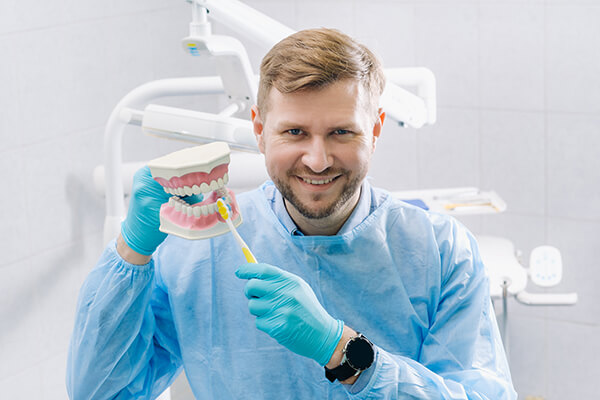An Overview to Typical Oral Conditions That Require a Dentist's Care
Toothaches, for example, can be symptomatic of severe concerns such as dental caries, split teeth, or abscesses, each requiring specific treatments like fillings or origin canals. Affected wisdom teeth and jaw problems can introduce significant pain and issues.
Toothaches
Toothaches are a typical oral problem that can range from light discomfort to extreme pain, frequently indicating a hidden issue that needs expert interest. This pain can come from a range of sources, consisting of tooth decays, split or fractured teeth, and dental abscesses. Each of these problems positions substantial dangers if left untreated, possibly leading to a lot more severe difficulties.
Dental dental caries, additionally understood as cavities, are caused by the build-up of plaque that erodes tooth enamel, leading to openings or pits in the affected teeth. Abscesses are painful infections at the origin of a tooth or between the gum tissue and a tooth, commonly resulting from serious degeneration or unattended dental caries.
Effective therapy of toothaches involves attending to the root cause. This might include dental fillings for cavities, crowns for split teeth, or origin canals and prescription antibiotics for abscesses. Very early intervention by a dental specialist can prevent additional deterioration and ease pain, guaranteeing optimal dental health and wellness.
Gum Tissue Disease
Periodontal illness, a widespread yet typically forgotten dental condition, shows up via inflammation and infection of the periodontals and sustaining cells. This condition mainly happens in 2 phases: gingivitis and periodontitis. Gingivitis, the milder form, provides with signs such as red, puffy gums that may bleed conveniently during cleaning or flossing. If left untreated, gingivitis can progress to periodontitis, an extra extreme type identified by the destruction of the supporting bone and connective cells, ultimately causing tooth loss.
The key reason for gum tissue condition is microbial plaque, a sticky, anemic film that continuously develops on teeth. Poor oral hygiene, smoking cigarettes, hereditary proneness, and particular medical conditions, such as diabetes, can exacerbate the threat of creating periodontal disease. Regular oral exams are vital for early discovery and management of this problem.
Therapy for periodontal illness ranges from specialist oral cleaning and scaling to advanced treatments like origin planing and periodontal surgery, depending on the extent. Keeping great oral health methods, including cleaning twice daily, flossing, and making use of an antibacterial mouthwash, can significantly lower the danger of gum condition and advertise much healthier periodontals.
Tooth Cavities
Tooth cavities, also referred to as cavities, are a typical dental condition characterized by the damage of tooth enamel as a result of acid-producing germs in the mouth. These microorganisms flourish on sugars and starches from food and drinks, producing acids that slowly deteriorate the enamel, causing dental caries formation.
Early-stage dental caries might not reveal signs, yet as they progress, they can trigger tooth pain, sensitivity to cool or warm, visible holes or pits in the teeth, and discoloration. If left unattended, tooth cavities can penetrate deeper layers of the tooth, home possibly causing severe pain, infection, and also missing teeth.
Preventing tooth cavities entails a mix of good oral hygiene methods and nutritional habits. Regular see here brushing with fluoride toothpaste, flossing, and routine dental examinations are essential. Dentists may also advise extra precautionary procedures, such as fluoride therapies and oral sealers, to shield teeth from degeneration.
Minor dental caries can be resolved with dental fillings, which bring back the tooth's structure. More advanced instances might need crowns or even origin canal treatment if the decay has gotten to the tooth's pulp.

Impacted Knowledge Teeth
Affected knowledge teeth are a widespread dental issue that happens when the 3rd molars, commonly referred to as wisdom teeth, fail to totally emerge or align appropriately within the mouth. This problem often results from inadequate room in the jaw or an uncommon development angle of the teeth. Impacted wisdom teeth can cause a selection of difficulties, consisting of pain, infection, and damages to nearby teeth.
When knowledge teeth come to be impacted, they are usually partially erupted or continue to be entirely underneath the gum tissue line. This partial eruption can develop a pathway for germs to go into the periodontals, causing infections that materialize as swelling, pain, and even fever. Additionally, impacted knowledge teeth can apply stress on surrounding teeth, potentially causing crowding or shifting.
A detailed dental evaluation, normally entailing X-rays, is important for identifying impacted knowledge teeth. Regular oral check-ups are a good idea to monitor the problem and maintain oral wellness.
Jaw Disorders
Jaw conditions, jointly called temporomandibular joint (TMJ) problems, encompass a series of problems that affect the jaw joint and surrounding muscular tissues. These see page disorders can materialize via symptoms such as discomfort or inflammation in the jaw, trouble chewing, a clicking or standing out noise when opening up or closing the mouth, and also chronic migraines. TMJ problems can arise from different variables, including arthritis, jaw injury, or regular habits like teeth grinding or jaw clenching.
Medical diagnosis of TMJ disorders normally includes an extensive evaluation by a dentist, consisting of a physical exam of the jaw, oral X-rays, and in some cases advanced imaging strategies like MRI or CT checks to analyze the joint's problem. Therapy options differ depending upon the intensity of the condition. Non-invasive approaches such as physical treatment, oral splints, and medicines targeted at reducing swelling and discomfort are typically first-line therapies. In more severe instances, surgical treatments might be needed to fix structural concerns within the joint.
Very early treatment by a dental professional is vital to avoid the progression of TMJ disorders and to preserve total oral health. People experiencing consistent jaw discomfort or disorder ought to seek prompt analysis and therapy.
Conclusion
Toothaches frequently show underlying issues such as tooth cavities, cracked teeth, or abscesses, needing punctual treatment. Affected knowledge teeth and jaw conditions likewise require professional focus to ease pain and stop additional difficulties.
Dental cavities, also known as decays, are caused by the accumulation of plaque that erodes tooth enamel, leading to holes or pits in the influenced teeth. Abscesses are uncomfortable infections at the origin of a tooth or in between a tooth and the gum, normally resulting from severe degeneration or unattended dental caries.

Furthermore, affected wisdom teeth can exert pressure on surrounding teeth, possibly creating crowding or changing.